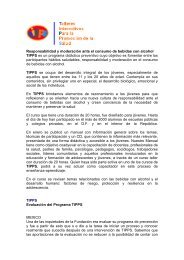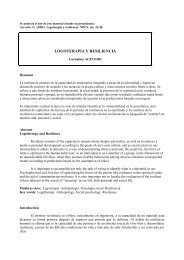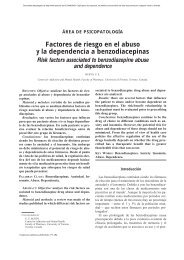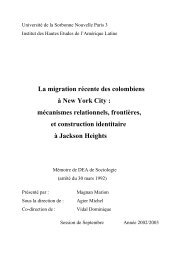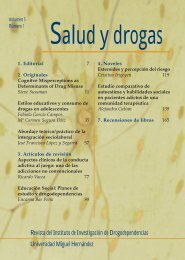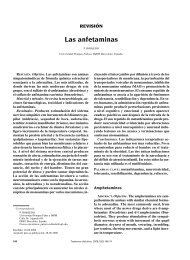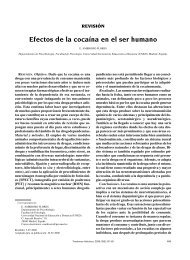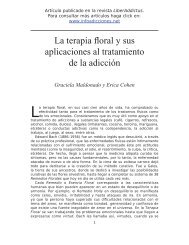migrant women in the United Arab Emirates
migrant women in the United Arab Emirates
migrant women in the United Arab Emirates
You also want an ePaper? Increase the reach of your titles
YUMPU automatically turns print PDFs into web optimized ePapers that Google loves.
Non-nationals do have <strong>the</strong> right to have <strong>the</strong>ir own organizations, under similar<br />
limitations. In <strong>the</strong> <strong>United</strong> <strong>Arab</strong> <strong>Emirates</strong>, <strong>the</strong>re are 17 associations of civil society<br />
perta<strong>in</strong><strong>in</strong>g to non-nationals, and 83 for nationals (M<strong>in</strong>istry of Labour Report, 1997).<br />
No tra<strong>in</strong><strong>in</strong>g or awareness campaign has taken place <strong>in</strong> <strong>the</strong> <strong>United</strong> <strong>Arab</strong> <strong>Emirates</strong><br />
regard<strong>in</strong>g <strong>the</strong> issue of foreign female domestic workers and protection of <strong>women</strong> <strong>migrant</strong>s.<br />
6.4. Protection of female <strong>migrant</strong> workers<br />
As previously stated, <strong>the</strong> <strong>United</strong> <strong>Arab</strong> <strong>Emirates</strong> Government has no special plans to<br />
protect <strong>migrant</strong>s and domestic workers, nor recognize <strong>the</strong>ir status as workers (Al Jallaf,<br />
2001).<br />
It appears that immigration officers do not receive any specific tra<strong>in</strong><strong>in</strong>g for<br />
respond<strong>in</strong>g to <strong>the</strong> concerns of <strong>the</strong> abused <strong>women</strong> (B<strong>in</strong> Saloom 2001).<br />
There is a general impression that <strong>the</strong> Government does not consider its responsibility<br />
to protect domestic workers or solve any conflict that arises between <strong>the</strong>m and <strong>the</strong>ir<br />
employers. Problematic cases are dealt with on an ad hoc basis, and sometimes <strong>the</strong>y lead to<br />
forc<strong>in</strong>g <strong>the</strong> employer to pay due wages or to releas<strong>in</strong>g <strong>the</strong>ir domestic workers.<br />
6.5. Assistance and services<br />
Accord<strong>in</strong>g to <strong>the</strong> Philipp<strong>in</strong>es Labour Attaché, some embassies have expressed<br />
satisfaction with <strong>the</strong> <strong>United</strong> <strong>Arab</strong> <strong>Emirates</strong> Government services and confirm that services<br />
have improved. Serious attempts are made to help domestic workers solve <strong>the</strong>ir problems.<br />
(Arriola, 2001).<br />
The Immigration Office also seems to try to improve its work and is ga<strong>in</strong><strong>in</strong>g<br />
experience <strong>in</strong> handl<strong>in</strong>g cases. However, <strong>the</strong> Office considers a close cooperation with <strong>the</strong><br />
embassies of <strong>the</strong> send<strong>in</strong>g countries crucial to solv<strong>in</strong>g problems (Said 2001).<br />
The experience, <strong>in</strong>volvement and follow-up by officials from <strong>the</strong> send<strong>in</strong>g countries<br />
play a key role <strong>in</strong> improv<strong>in</strong>g practices on <strong>the</strong> receiv<strong>in</strong>g end. When compared to o<strong>the</strong>r<br />
<strong>migrant</strong> nationalities, Filip<strong>in</strong>os are thought to give a better impression. This was also<br />
confirmed by <strong>the</strong> Dubai Police (Frandon, 2001). Indeed, when an Indonesian <strong>migrant</strong><br />
(Karikender) was convicted of adultery, officials <strong>in</strong> <strong>the</strong> <strong>United</strong> <strong>Arab</strong> <strong>Emirates</strong> did not give<br />
her <strong>the</strong> same attention, even though <strong>in</strong>ternational NGOs were active <strong>in</strong> <strong>the</strong> case. Clearly,<br />
<strong>the</strong> level of <strong>in</strong>volvement, experience and susta<strong>in</strong>able improvement of practices of <strong>the</strong><br />
sender country, make a difference <strong>in</strong> <strong>the</strong> life of <strong>the</strong> <strong>migrant</strong>.<br />
The <strong>in</strong>volvement of <strong>the</strong> sender countries is, however, not sufficient <strong>in</strong> itself and <strong>the</strong><br />
receiv<strong>in</strong>g side has to improve its practices. In <strong>the</strong> case of <strong>the</strong> <strong>United</strong> <strong>Arab</strong> <strong>Emirates</strong>, <strong>the</strong><br />
situation is, <strong>in</strong> general, unacceptable. The many people <strong>in</strong>terviewed for this report all agree<br />
on <strong>the</strong> need to change <strong>the</strong> legal and contractual status of foreign female domestic workers.<br />
6.6. Migrant workers’ freedom of association<br />
As mentioned before, no <strong>migrant</strong> workers are allowed to form any type of association<br />
as it is considered threaten<strong>in</strong>g to <strong>the</strong> state and <strong>in</strong>ternal security. In fact, <strong>United</strong> <strong>Arab</strong><br />
<strong>Emirates</strong> police and security are very active <strong>in</strong> suppress<strong>in</strong>g association. This issue relates<br />
to all workers <strong>in</strong> <strong>the</strong> <strong>United</strong> <strong>Arab</strong> <strong>Emirates</strong>, males and female, although discrim<strong>in</strong>ation<br />
aga<strong>in</strong>st male workers organiz<strong>in</strong>g is considered more important than females.<br />
UAE Work<strong>in</strong>g Paper_1 43



